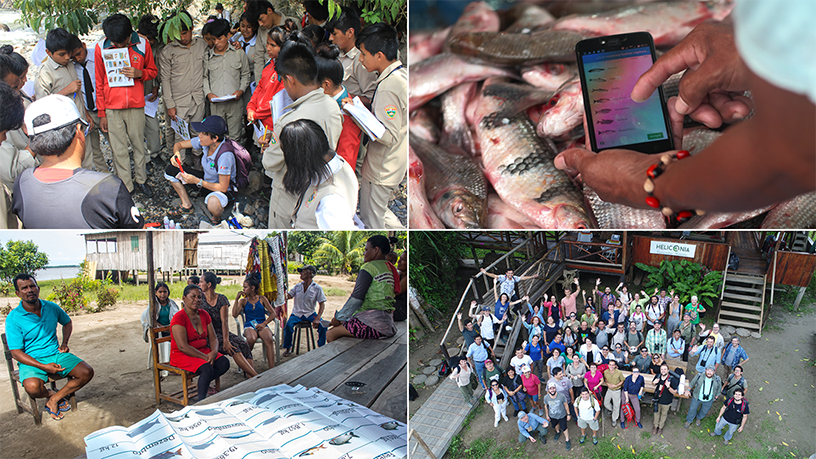Citizen science protects fishing in the Amazon
fishing
A wide-ranging regional initiative is pooling indigenous, local, and international knowledge and efforts to study and protect Amazon freshwater systems.
For people living in the basin of the Amazon River—an area the size of the continental United States and home to 30 million people—fish are the most important source of animal protein, and fishing is the most important source of income. Yet the Amazon’s aquatic ecosystems are being threatened by the expansion of agriculture, cattle pastures, infrastructure, logging, mining, and overfishing.1 Managing fish populations is critical to sustaining these ecosystems and the human communities dependent on them. In turn, collecting, monitoring, and sharing data are critical to managing sustainable fisheries.
Citizen Science for the Amazon, created in 2017, is a network of multiple stakeholders, including more than 100 groups of citizen scientists (fishermen, indigenous peoples, local communities, and students) from across the Amazon basin and more than 25 academic, conservation, and grassroots organizations from seven countries.2 These citizen scientists regularly monitor fish migrations and water quality, registering and sharing their observations via a common app and a platform. This platform is designed to guide data management decisions by connecting local efforts, using interoperable standards, aggregating data, and making the information open, safe, and accessible.3 The result is the first database of the entire Amazon basin that is available for researchers, practitioners, and decision-makers.
Participants jointly define a large-scale question that is general enough to attract multiple stakeholders, but simple enough to encompass questions at smaller scales (see figure S8.2.1). Local partners work with citizen scientists to identify what local questions to answer, how to analyze and use the data, what decisions to inform, and what audiences to target.
Citizen Science for the Amazon jointly designs, tests, and adapts innovative solutions to the Amazon context. Over time, partners have agreed on elements of the data governance framework, including guiding principles, variables, protocols, terms of use, credit, and protection of privacy. Citizen science is supplanting traditional, prohibitively expensive, scientific survey methods and helping to bridge indigenous, local knowledge and mainstream, professional science.
Public engagement fosters the sustainable use and management of fish and natural resources, conserves key rivers, lakes, and wetlands, and improves livelihoods. It also empowers local communities to negotiate with government agencies and other stakeholders on issues such as securing fishing permits, selling sustainably caught fish in niche markets with higher prices, using evidence in grievance cases against hydroelectric dams for their impact on reducing fish stocks, and requesting supplemental social security income during no-fishing seasons. Leaders of the United Nations Environment Programme have recognized the significant contribution that citizen science is making to achievement of the Sustainable Development Goals.4
Where and when do fish migrate in the Amazon basin and what environmental factors influence those migrations?
Network partners use diverse technologies to answer the question and
* gather, share and use data,
* collaborate in generating information for multiple purposes and audiences

- Top left: Community-based, participatory and Indigenous and local knowledge methods, tools and protocols (e.g., journals, printed survey forms, community maps) facilitate engagement of diverse audiences.
- Top right: Ictio.org is an application and open & safe database to collect and share information on Amazonian migratory fish.
- Bottom left: Data is safely transferred and stored in servers. Then, open data is accessible to multiple audiences with diverse levels of access and in user-friendly formats.
- Bottom right: Collaboration is enabled through carefully designed methodologies, in-person and virtual meetings, social media, Google platform and tools.
Source: Ciencia Ciudadana para la Amazonía (Citizen Science for the Amazon), Lima, Peru. Website screenshot © Citizen Science for the Amazon Network, Wildlife Conservation Society (WCS). Used with permission; further permission required for reuse.
Photo credits (clockwise, from top left): © G. Da Roit/WCS; © J. Becerra/WCS; © V. Eyng/Instituto de Desenvolvimento Sustentável Mamirauá; © Julio Araújo/Centro de Innovación Científica Amazónica. All images used with permission; further permission required for reuse.
Information in this spotlight was supplied by Libby Hepburn, co-chair of the Sustainable Development Goals and Citizen Science Maximisation Group and co-chair of the Open Science and Citizen Science Council of Parties; Mariana Varese of the Wildlife Conservation Society; and Lea Shanley, senior fellow, Nelson Institute for Environmental Studies, University of Wisconsin–Madison.
- Alho, Reis, and Aquino (2015, 412).
- See Ciencia Ciudadana para la Amazonía (Citizen Science for the Amazon)
- See Ictio (dashboard), Citizen Science for the Amazon, Lima, Peru.
- See UNEP (2019). In addition, citizen science is a core component of open science (for example, see OECD 2015). The United Nations Educational, Scientific, and Cultural Organization (UNESCO) is developing a global policy and regulatory agenda on open science. As part of this effort, UNESCO launched a global consultation on open science, which has included consultation through the Citizen Science Global Partnership. UNESCO “is expected to define shared values and principles for Open Science and identify concrete measures on Open Access and Open Data with proposals to bring citizens closer to science and commitments to facilitate the production and dissemination of scientific knowledge around the world.” (See “UNESCO Recommendation on Open Science,” United Nations Educational, Scientific, and Cultural Organization, Paris) Such recommendations are legal instruments with the aim of influencing the development of national laws and practices that UNESCO member states will be asked to report on. They represent a major opportunity for influencing the uptake of citizen science around the world.
- Alho, Cleber J. R., Roberto E. Reis, and Pedro P. U. Aquino. 2015. “Amazonian Freshwater Habitats Experiencing Environmental and Socioeconomic Threats Affecting Subsistence Fisheries.” Ambio 44 (5): 412–25. doi: 10.1007 /s13280-014-0610-z.
- OECD (Organisation for Economic Co-operation and Development). 2015. Making Open Science a Reality. OECD Science, Technology, and Industry Policy Paper 25 (Octo-ber 15). Paris: OECD.
- UNEP (United Nations Environment Programme). 2019. “United Nations Environment Programme Contributions to Secretary-General’s Background Note for the Preparatory Meeting of the 2020 United Nations Conference to Support the Implementation of Sustainable Development Goal 14.” Nairobi, Kenya, October 31, 2019.